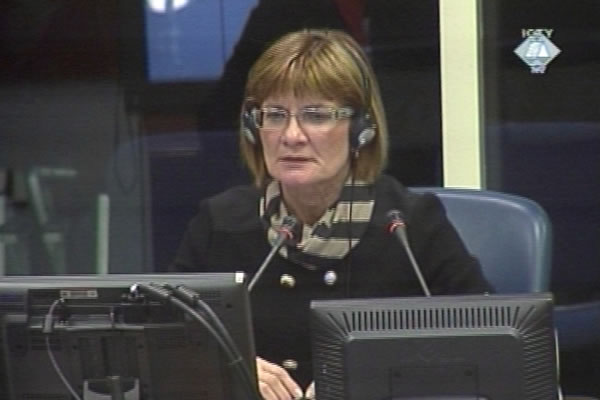Home
‘REVOLUTIONARY JUSTICE’ OR PROTECTION OF SERB PROPERTY?
Snjezana Bagic, one of the authors of the law on temporary takeover of property abandoned during and after Operation Storm, is testifying as Mladen Markac’s defense witness. Bagic contends that the goal of that law was not to prevent Serbs from coming back. On the contrary the law was aimed at protecting abandoned Serb houses by letting them temporarily to Croatian returnees and refugees
 Snjezana Bagic, defence witness of Mladen Markac
Snjezana Bagic, defence witness of Mladen Markac The first working day of the new year at the Tribunal began with the evidence of Snjezana Bagic. A judge of the Croatian Constitutional Court, Bagic came to The Hague as a defense witness called by the former Croatian Special Police commander Mladen Markac. Markac is on trial with generals Ante Gotovina and Ivan Cermak for his role in the joint criminal enterprise aimed at permanent elimination of Serbs from Krajina during and after Operation Storm in 1995.
As alleged by the prosecution, when the Croatian authorities passed the legislation allowing the temporary takeover of property abandoned in the summer of 1995, they showed their intention to prevent the Serb refugees from returning after Operation Storm. Snjezana Bagic, who was a secretary in the Ministry of Justice at the time, took part in drafting the controversial law, whose full title is the Law on the Temporary Takeover and Management of Certain Property. Bagic contends that the act was not aimed at preventing return; its goal was to protect the property targeted by looters and arsonists.
As the witness explained, the legislator’s intent was to give the abandoned property to Croat returnees and refugees from BH who had lived until then in free parts of Croatia. In addition to dealing with the housing issue, this prevented the devastation of abandoned houses and looting of movable property, Bagic noted.
The Government’s decree of 31 August 1995 gave Serbs thirty days to return to Croatia and reclaim their property. In late September 1995, a law was passed extending this period to 90 days. The prosecution has alleged that the change was brought about by the pressure from the international community. Bagic however said that it was done because the 30-day period turned out to be ‘unrealistic’ and too short. In early 1996, all deadlines for the restitution of property were abolished and the issue was solved a little later with an agreement between the states of Croatia and FR Yugoslavia.
Defense counsel Mikulicic showed a UN document of 23 October 1995, criticizing harshly Croatia’s attitude towards abandoned property, claiming it was ‘legalizing ethnic cleansing’ and confiscating property ‘in the spirit of revolutionary law’. The witness said that she didn’t understand how the author of the UN document could say that the property was confiscated, when the government’s decree and the law clearly state that it was a temporary takeover of abandoned property, the witness noted. The Court of Human Rights in Strasbourg confirmed this in its judgments in the lawsuits filed by several Serb returnees.
As the hearing today drew to a close, prosecutor Gustaffson began cross-examining Snjezana Bagic.
Linked Reports
- Case : Gotovina et al. - "Operation Storm"
- 2009-12-18 CROATIA MAY CONTINUE ITS SEARCH FOR ARTILLERY DOCUMENTS
- 2009-12-18 WITNESS: ‘ARMY TROOPS, NOT POLICE, BURNED HOUSES’
- 2009-12-17 EUROPEAN UNION ASKED TO DELIVER ‘KNIN LOGBOOK’
- 2010-01-12 GOOD IDEA THAT SOMETIMES DIDN’T WORK
- 2010-01-13 DEFENSE EXPERT: ‘SPECIAL UNITS DIDN’T CONTROL TERRITORY’
- 2010-01-14 FEW INCIDENTS IN LARGE-SCALE SEARCH
